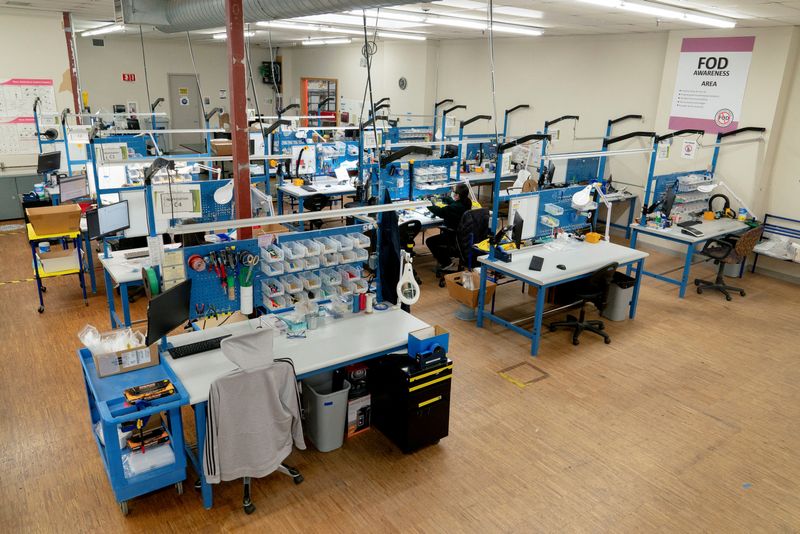By Allison Lampert and Tim Hepher
(Reuters) - Boeing (NYSE:BA)'s two-week-old strike has forced aerospace supplier Pathfinder Manufacturing to furlough 14 out of the company's 54 employees, and CEO Dave Trader fears he may need to send more home if the stoppage grinds on.
Pathfinder runs a project to attract new recruits to the aerospace industry, and trains them alongside skilled workers at its facility yards away from Boeing's Everett jet factory outside Seattle, the largest manufacturing building in the world.
Besides the 14 workers, the strike has sent high school students training for aerospace careers at Pathfinder back to their regular classrooms, in a double blow to a sector struggling for skilled labor.
"We want to keep them on, so we’re trying to help them the best that we can, but at the same time I’m trying to keep this company afloat," said Trader, 60, who has led Pathfinder through most of its 33-year existence.
Some 30,000 machinists downed tools in Boeing's West Coast factories on Sept. 13, halting production of the best-selling 737 MAX and older 767 and 777 wide-body programs. The company's supply chain is now fretting about how to retain thousands of workers set to be furloughed in the coming weeks during the planemaker's first strike in 16 years.
Of nine suppliers contacted by Reuters, five said they had begun placing workers on furlough or holding off on investments. A separate strike at aerospace group Textron (NYSE:TXT) highlights broader labor market pressures in the aerospace industry.
Pathfinder is covering the costs of the 14 workers' health care benefits to help retain them when orders rebound.
"We want them back and we’re trying to give them that carrot to get them back," Trader said.
Unlike other CEOs, Trader is also a fundraiser, since Pathfinder combines paid contractual work with a nonprofit "Work Force Development Center" where high school students and adults with disabilities in the Puget Sound area learn high-tech aerospace skills.
Boeing recently visited Pathfinder as part of a routine inspection.
"Their biggest concern was when we start doing these stand-bys (furloughs), how easily are we going to be able to get people back," Trader said.
CASH SQUEEZE
Boeing put most white-collar staff on rolling furloughs and said it would freeze most parts orders except on the 787, made in South Carolina. The company and its suppliers are also reeling from a series of crises including a MAX safety grounding after two fatal crashes; a global slump in air travel during the pandemic; and a quality crisis compounded by output curbs placed on Boeing since the blowout of a door plug in January.
Experts say Boeing is caught between the pressing need to save cash now and the conflicting need to preserve the ability to raise output and generate cash quickly after the strike. This would mean spending money on parts to keep suppliers' factories humming.
Until recently, Boeing had pledged to take as much inventory from suppliers as possible to keep supply lines "hot" or active.
But Boeing's ability to support suppliers is fading. The company's credit rating is hovering at close to junk status, and its defense arm has been losing as much as it used to make.
Boeing CFO Brian West has said the strike would make it harder to stabilize its supply chain. Boeing union officials were not available for comment.
RECOVERY CUT SHORT
At the opposite end of Boeing's colossal Everett factory complex from Pathfinder, New Tech Industries makes specialized tooling, with Boeing accounting for 85% of its business.
A backlog of orders will keep its machines running into next year, said co-owner Carmen Evans. "But currently, we aren't getting new orders placed, so I may feel that in a few months."
New Tech, based in Mukilteo, Washington, has struggled to return to full staffing since the pandemic shook manufacturing worldwide and started a drift toward retirement or flexible jobs.
An earlier 737 production halt following crashes in 2018 and 2019 also left its mark. New Tech went from 38 employees to 25.
"So it kind of sucks that we were just getting into a good spot, and now we're like what's going to happen," Evans said.
The company has put off plans to renew two machines - just the type of investment Boeing will need suppliers to make if it is to chase European rival Airbus, which has vaulted ahead of Boeing to become the world's biggest plane maker, outproducing Boeing two to one.
"I'm not going to try to grow things right now until this gets resolved," Evans said.
Some local Boeing suppliers are preparing pitches to serve Airbus, but experts say that will not help them immediately. One European supplier said it takes on average 18 months to get on a new Airbus program even when the partners know each other.
Also, Airbus has struggled to boost its output to take advantage of Boeing's stumbles.
For hundreds of small suppliers around Puget Sound, the unrest merely reflects a pause in the war for skills.

"Having seen some of the other strikes, I've seen what's happened after the strike is over," Trader said.
"At the end of the day everyone is going to start hiring like crazy, because they're going to want to ramp up."